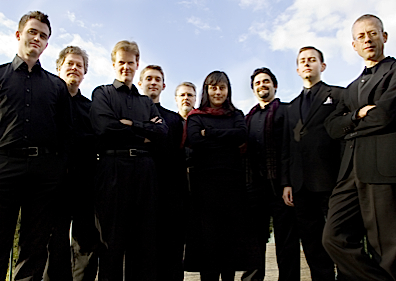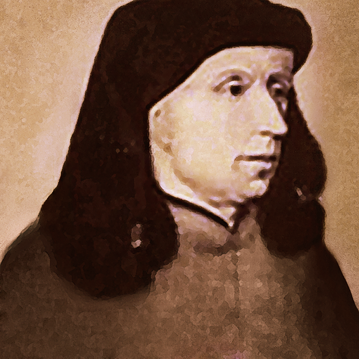Blue Heron opens Music Before 1800 season with subtle Ockeghem

Blue Heron opened the season for Music Before 1800 Sunday at Corpus Christi Church. Photo: Liz Linder
According to those in the know, two qualities in music highly prized during the lifetime of Johannes Ockeghem (c. 1420-1497) were varietas and subtilitas. (Of course, these traits have been admired in all eras, if not necessarily in Latin.)
To appreciate the variety of this great composer’s output, it helps to hear a lot of it at one sitting. And when it comes to subtlety, few vocal groups anywhere can match Boston-based Blue Heron, which gave delectably nuanced performances of music by Ockeghem (and a few contemporaries) Sunday afternoon at Corpus Christi Church in Morningside Heights.
The program identified the group’s eight singers, who performed the various works in sub-groups of two to five in 15th-century terms: soprano Margot Rood and countertenor Martin Near, for example, were the “cantus” or highest voice, while “tenors and countertenors” Owen McIntosh, Jason McStoots, Stefan Reed, and Sumner Thompson filled out the middle parts, supported by the “bassus” of Paul Guttry and David McFerrin.
As the only woman in the group, Rood put a particular flute-like shine on the sound of the pieces she performed in, without disturbing the transparency and balance that also characterized the all-male ensembles.
In all configurations, the singers meshed flawlessly without a conductor. Blue Heron’s director, Scott Metcalfe, performed only once all afternoon, supporting two singers with his Renaissance fiddle in Barbingant’s song “Au travail suis.”
Standing at the front of church’s chancel/choir area, the singers sounded supported but not blurred by the room’s mild resonance. It would have been easy to settle back in one’s pew and just bask in the sound of pure, immaculately tuned voices intertwining in the vibrant air.
But when performing in New York’s most academic neighborhood, learning must be served. So director Metcalfe, in a lengthy program note and spoken comments, endeavored to unravel the program’s “complex of interrelated works”—that is, two mass settings by Ockeghem and the popular songs by him and others on which they were based.
For listeners of the time, the lyrics of a familiar song might have provided a subliminal “gloss” on the text of the Latin mass when they heard the tune. (Think jazz great John Coltrane appropriating a Broadway show tune by Richard Rodgers for his own purposes in “My Favorite Things,” and you’re part way there.)
In the time-honored tradition of finding theological meaning in love poetry—Song of Solomon, Christ as Bridegroom, etc.—a lover’s plea to his unattainable mistress in a song could inform the “miserere nobis” (have mercy on us) of a mass dedicated to the Virgin Mary, such as Ockeghem’s Missa Ma maistresse.

Johannes Ockeghem
Sunday’s program was hardly the freshman course, since the songs by Ockeghem and the obscure but masterful Barbingant (even the composer’s first name is unknown) were contrapuntally sophisticated in themselves, and then Ockeghem’s masses on them added still more layers of wit and allusion.
Metcalfe was kind enough to begin the program with an item completely unrelated to this tangle of influences, a vibrant performance of the five-part motet “Celsitonantis ave genitrix” by Johannes Regis, which seemed just the right appetizer and ear-opener for an afternoon of early Renaissance counterpoint, Low Country style.
The song “Au travail suis” (I am in agony) eased onto the contrapuntal scene with just two singers and a fiddle, performing the yearning text with intense expression. The “Kyrie” and “Gloria” of Ockeghem’s Missa Au travail suisfollowed, citing the song clearly in the former, but branching out with daring harmonies and great varietas of texture and density in setting the long text of the “Gloria.”
The rest of this mass had to wait till the concert’s second half, as the singers turned next to the U.S. premiere—and possibly the first performance anywhere since the 15th century—of the song “En atendant vostre venue” (While awaiting your arrival), composer anonymous, which was discovered three years ago in a treasure-trove manuscript of hit tunes containing some familiar items but also 12 songs previously unknown to scholars of the period.
Listening to two deep voices curling seductively under the song’s soaring tenor, one felt gratitude and a touch of awe at what Metcalfe described as “the first major rediscovery in the field of fifteenth-century song since before the Second World War.”
The program’s first half closed with Ockeghem’s plainchant-based “Credo sine nomine,” a work that shares a passage or two with the Missa au travail suis, but impressed on Sunday mostly for its marvelous variety of two-, three-, and four-voice textures.
In the program’s second half, the ensemble singing reached still loftier heights of execution, beginning with Firminus Caron’s mellow drinking song “Cent mille ecuz” (A hundred thousand ecus) and its suggestion of hiccups and dancing, continuing with the final three movements of the Missa Au travail suis in styles that ranged from complex polyphony to brick-wall homophony, and culminating in the melancholy phrases of Ockeghem’s song “Ma maistresse,” articulated in exquisitely-timed pauses and soft attacks, the singers seeming to breathe as one.
The program closed with sinewy performances of Kyrie and Gloria, the only extant movements of Ockeghem’s Missa Ma maistresse. During the latter, singers came forward to join the original quartet until eventually all eight members of the group brought the concert to a robust close.
The next concert of Music Before 1800 is Capella Pratensis in works of Pierre de la Rue and others, 4 p.m. October 15 in Corpus Christi Church. mb1800.org; 212-666-9266.